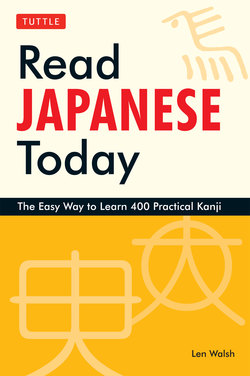Читать книгу Read Japanese Today - Len Walsh - Страница 10
На сайте Литреса книга снята с продажи.
Оглавление♦ SECTION 2 ♦
To form the kanji for a sword the Chinese drew a sword as then squared it off to 刀. As a kanji by itself it is pronounced KATANA. Combined with other kanji in compound words, it is usually pronounced TŌ.
When 刀 is used as an element in a new kanji and appears in the left-hand or right-hand portion of the new kanji’s square, it is often abbreviated to 刂. When it appears at the top or the bottom of the new kanji’s square it remains 刀, although its proportions may change to fit the square. A 小刀, SHŌTŌ, is a short sword and a 大刀, DAITŌ, is a long sword.
The Chinese started with the sword 刀 then, onto the blade, added a mark ヽ to emphasize the meaning blade. They wrote the new kanji in final form like this 刃, meaning blade. Used as a word by itself it is pronounced HA. Used in compound words 刃 is pronounced JIN.
When 刀 sword is added as an element to the element for eight 八 (used in its meaning of divide) it forms the new kanji 分 meaning cut and divide. This kanji, 分, has many other meanings, but all subsume the idea of cut and divide. Used by itself, 分 is pronounced WAKARU (intransitive) or WAKERU (transitive). In compound words it is pronounced BUN, FUN or BU. The common word in Japanese for understand is 分 WAKARU (to cut and divide knowledge into bite-size bits so it can be absorbed).
Many Japanese words, particularly those in common language as spoken for millennia, have many exceptions to the rules of definition and pronunciation. For example, 分, a very common character, in compounds means a piece or part or division, after something has been cut and divided. 一分 IPPUN (changed from ICHIFUN for euphony), means one minute, a division of an hour. The same kanji written in the same way 一分 also has the specialized meaning of one-tenth, in which case it is pronounced ICHIBU. The compound word 十分, JIPPUN, ten-minutes, means ten minutes. The same two characters in the same order in another compound word 十分 are pronounced JUBUN, ten-parts-out-of-ten, which means enough, sufficient, adequate.
分子 BUNSHI, piece-child, means molecule. Pronounced exactly the same way, 分子 also means the numerator of a fraction. (The denominator of a fraction is 分母 BUNBO, mother-part.)
The Chinese took the Asian glyph for number seven , turned it upside down 七 and used it as the character for seven. It is pronounced SHICHI either in compound words or by itself. 七 can also be pronounced NANA or NANATSU (with kana) either in compound words or as a word by itself.
Then they added 七 seven to 刀 sword to get enough cutting power and made a new composite kanji 切, meaning cut. Used by itself it is pronounced KIRU. In combination with other kanji it is pronounced SETSU.
From a view of a flowing river the Chinese drew the pictograph for river . In final form they straightened it to 川. Used by itself it is pronounced KAWA, sometimes changed to GAWA for euphony. In compound words it is pronounced SEN. It is often used in family and geographical names, where it is generally pronounced KAWA. Examples are 立川 TACHIKAWA, Rising-river and 小川 OGAWA, Small-river.
The Chinese added sandbanks to the river to indicate a bit of land surrounded by water. They drew the kanji in final form as 州. It retains the meaning of sandbank, and has the extended meanings of land surrounded by water and a separate political state. It is pronounced SU when used by itself, and SHŪ when used in compound words. 本州 HONSHŪ, main-state, is the name of the main island of Japan. 九州 KYŪSHŪ, nine-states, is the southern-most of the main islands of Japan. It took its name from the island’s nine ancient provinces.
The Chinese saw that if you squeeze a river you get water. They drew the pictograph for water therefore first as and finally 水. Used as a kanji by itself 水 is pronounced MIZU. Used with other kanji in compound words it is generally pronounced SUI, as in 水 分 SUIBUN, water-portion, meaning moisture. In what looks to be an exception to the pronunciation rules, 大水 big-water, meaning flood, is pronounced ŌMIZU, but in this case 水 water is actually a word by itself modified by 大 big, and is not part of a compound word.
